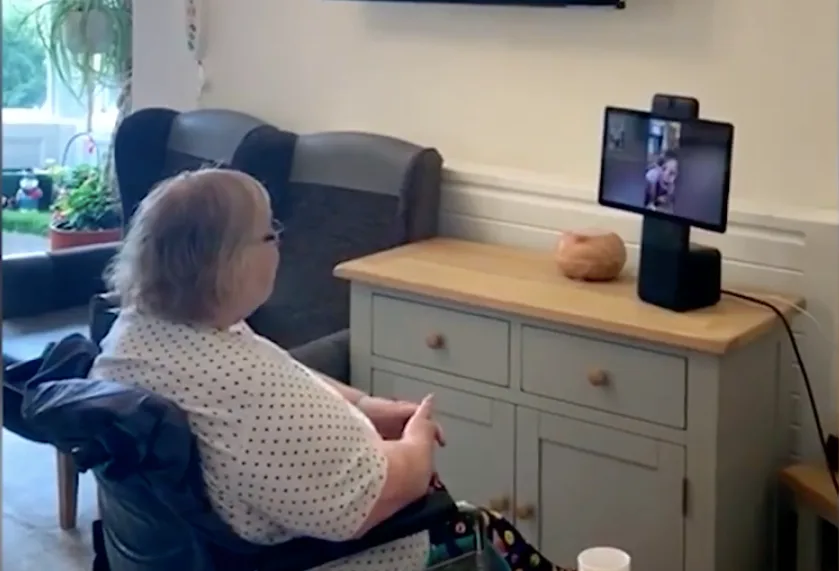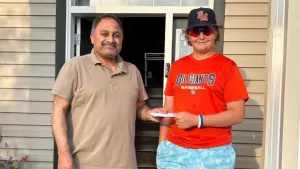
'Adopt a Grandparent' battles loneliness during COVID-19 pandemic
The U.K.-based Adopt a Grandparent campaign started off with about 130 local volunteers, but when COVID-19 hit, the campaign went digital. Now more than 75,000 volunteers are registered across the world.
Aged just six years old, Freya has adopted a 74-year-old woman named Sheila.
It’s all part of a campaign to combat loneliness. Now, more than ever, people living in care homes are feeling isolated. One U.K.-based care home decided to take a campaign they started late last year and tweak it to work during the pandemic.
“As you can imagine these people are already very, very vulnerable and with the advent of COVID-19, we've had to restrict all visitors to all of our care facilities. So the feelings of isolation, loneliness and fear are very prevalent among the people that we look after,” said Shaleeza Hasham, head of hospitality, communications and commissioning at CHD Living.
CHD Living consists of 13 residences throughout Surrey, England. They provide care for more than 800 vulnerable people.
“The Adopt a Grandparent campaign is a very special campaign to me personally. My parents founded CHD Living in 1984 and when we started the family business, when I was born I lived in a cottage at the bottom of the hill of our first nursing home and so I immediately had 15 adopted grandparents of my own. It was a really amazing upbringing,” reminisced Hasham.
Back in October 2019 Hasham started the Adopt a Grandparent campaign. Around 130 local volunteers signed up to visit the residents in the various homes.
Fast forward to 2020 and Covid 19 forced the facilities to close their doors.
“Our residents were quite sad that these relationships might not be sustained moving forward. We thought about how we could continue to support the residents and the young people who had volunteered and we decided to take the whole campaign digital,” said Hasham.
“We had no idea that it would actually create the kind of movement it has where we now have about 75,000 volunteers registered across the world, including loads in Canada which is awesome,” said Hasham.
She listed several places where volunteers reside, including: Australia, Greece, the Middle East, Africa, and India.
“Literally it knows no bounds.”
The homes have received letters, video messages, artwork, and even songs.
Here’s The Weather Network’s rendition of You Are My Sunshine:
“It's been overwhelming and absolutely heartwarming to see the number of people who are willing to give up their time in order to make somebody else's a little bit brighter,” said Hasham. “The amount of joy that it brings to the people that we're caring for is, you can't put a price on this. It's unbelievable.”
Staff members say the response has been heartwarming. They are overwhelmed with then number of people looking to adopt.
“We do currently have a waitlist. What we do is, we hand pair every person with the volunteer based on common interests, likes and dislikes. That takes a lot of time. We've realized the value of what we have and we want to make it a scalable and sustainable initiative that will continue way past COVID-19,” said Hasham.
“People are signing up every day. Our databases are crashing. It's absolutely phenomenal and it's exciting and it's heartwarming,” she added.
Even though there may be a waitlist to adopt, Hasham says they still share the content coming in with residents.
“It gets shared on our social channels. It gets shared directly with our residents via our wellbeing angels in our homes, so it is not for nothing. It is making a difference to people's lives.”
The hope one day is to have residents meet their virtual pen pals in person.
“So to do this actually we are registering as a charity here in the U.K. and we're reaching out to other providers of care for them to have their own residents get involved and be paired with our volunteers worldwide,” she said.
Right now the campaign is asking for English-speaking volunteers but that may soon change.
“There's one angle we're looking at the moment whereby we can connect our residents, who where English might not be their first language, with a volunteer who might also share that first language. The reminiscence therapy that comes out of this for people living with dementia and other cognitive impairments is really, really quite amazing,” said Hasham.
“Because if you have somebody living in a facility who, for example, has a love of painting, or a love of music and you pair them with somebody in the world who has a similar love, and they're talking about this together, it brings back so many lovely memories and thoughts and moments of happiness for the person who might not necessarily have those triggers in their day-to-day life to be able to experience a joy.”
The campaign has succeeded in bringing the outside world into vulnerable people’s homes.
“It doesn't matter where you're from or what you have or where you come from, what COVID-19 is teaching us all, is that we are all the same. We enjoy the same highs and the same lows and we’re suffering the same hardships and challenges at the moment. That for me was like, borders and oceans, they just don't matter.”










